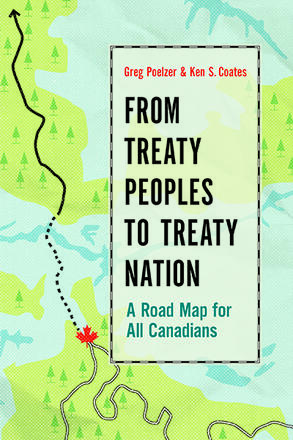
From Treaty Peoples to Treaty Nation
A Road Map for All Canadians
This book is a realistic but refreshingly optimistic look at how Canada can adjust to the rights and aspirations of Aboriginal peoples and, in the process, ensure a better future for all Canadians.
Description
“This timely and thought-provoking book is a welcome addition to ongoing conversations about how best to achieve reconciliation with Aboriginal peoples and complete the unfinished work of federalism. ” –Jody Wilson-Raybould
Canada is a country founded on relationships and agreements between Indigenous peoples and newcomers. However, the cooperative spirit of the treaties is being lost as Canadians engage in endless arguments about First Nations “issues. ” The authors breathe new life into the debates by looking at approaches that have failed and succeeded in the past and offering all Canadians—from policy makers to concerned citizens—realistic steps forward. They highlight Aboriginal success stories and redirect the conversation to a place of common ground. Upholding equality of economic opportunity as a guiding principle, they argue that all Canadians need to take up their responsibilities as treaty peoples.
Reviews
… a welcome help to understanding ourselves as a nation and as individuals … Greg Poelzer and Ken Coates offer an accessible primer to the many ways Canada’s Indigenous peoples are retaking charge of their lives.
- Jean Barman, 2015 recipient of the Governor General’s History Award for Scholarly Research
The book provides an excellent summary of the work of various Canadian Indigenous political scholars such as Kiera Ladner, Bonita Beaty, Dan Russell, John Borrows and Glenn Coulthard. The treaty theme runs throughout the book, with historical and contemporary examples. This allows the reader to understand the past but also facilitates awareness of the modern-day treaty process that is underway in some parts of Canada.
- Cora Voyageur, professor of sociology at the University of Calgary, and member of the Athabasca Chipewyan First Nation
The greatest value of this volume [is that] it seeks to force productive debate, not fruitless fingerpointing and rancor. Whether or not it succeeds in doing so for Canada remains to be seen. Whether the United States, including the many indigenous peoples in the Great Plains, takes notice and begins more meaningful discussions of Americans as “Treaty Peoples” and a “Treaty Nation” likewise remains unclear. As a region with strong indigenous history and presence, these are debates worth having — on both sides of the border.
- Brenden W. Rensink, Charles Redd Center for Western Studies Brigham Young University
What is clear from this survey is that no consensus exists around how to improve Aboriginal and non-Aboriginal relations. This sketch by Poelzer and Coates does, however, do more than provide the reader with a useful review of proposals aimed at solving the “Indian problem” in Canada; it allows the authors to situate their own approach within a very complex debate characterised by a diversity of opinions (both within the Aboriginal and non-Aboriginal intellectual communities). From Treaty Peoples to Treaty Nation’s originality flows from its focus on the practical elements of these problems. By contrast, most other scholars’ approaches are philosophical, idealistic, and theoretical … With the Truth and Reconciliation Commission of Canada’s release of its Final Report earlier this year, Poelzer and Coates’ work could not be timelier.
- Darius Bossé